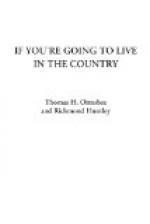For the first, nothing is better than newspaper classified advertising, particularly that found in the Sunday paper. If he would have a farm far from the madding crowd, there are the farm catalogues issued by a variety of real estate organizations. These can be most helpful if intelligently read. And the prospective buyer of a fancy farm or sporting estate will do best to turn to the advertising columns of those magazines where the editorial scope deals with that type of country life.
[Illustration: AN OLD FARMHOUSE IN THE ROUGH
Photo by John Runyon]
Consulting such advertising for whatever kind of country home is wanted will give the prospective buyer some definite impressions. Of course he won’t know what any of the places actually look like, though reading between the lines may give him some idea; but he will at least have gleaned a little information as to prices in a given locality and have the names of brokers with offerings that might be of interest. A decade ago, if one really wanted a country place one began looking at actual pieces of property at this point, either with or without a broker. During the past two or three years, however, a novel source of information regarding such property has come into being.
It is somewhat of a cross between a news reel moving picture theatre and a real estate broker’s office. There is a projection room, a small moving picture machine, and an extensive file of films of various properties that are on the market. Here the prospective buyer is shown shorts of all those listed with that particular clearing house. After the showing, if one or more places appeal sufficiently so that the prospect wants to visit them, he is given the broker’s name and address. This saves much time and hours of travel for all concerned.
In an hour or two spent so shopping, you can get first impressions of more places than you could possibly visit in a month of week-ends. Thus you can limit your selection of places to be visited. The cost of this novel method of showing property is met by an arrangement whereby seller and broker reward the picture house if the sale is consummated.
When you actually begin to look at property, a few don’ts are in order if you would steer a fair course to the country home you have in mind.
Don’t expect any place to have all the requirements included in your mental picture.
Don’t buy a place that does not appeal to you. Each year you will like it less.
Don’t buy a bargain without finding out why it is below the prevailing price. Only too often it proves extremely expensive.
Don’t disparage a piece of property with the naive idea that by so doing the price will be lowered. You only arouse resentment on the part of the owner.
Don’t make a pest of yourself by too frequent visits to a place that attracts you.
Don’t try to eliminate the real estate broker. If he really knows his territory, his services are worth far more than his fee which is paid by the seller anyway.




